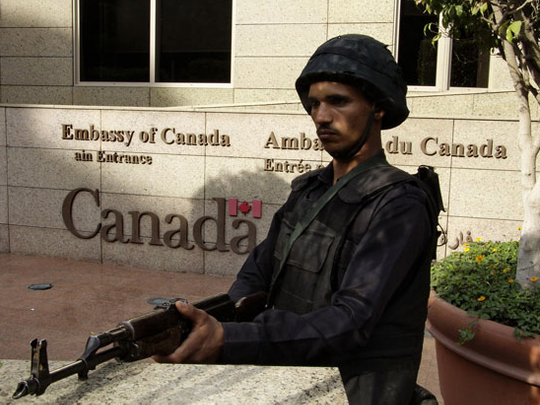
Cairo: The ongoing closure of the British and Canadian embassies in Cairo has had no impact on Egyptian tourism struggling to recover from more than three years of stagnation, officials and travel agents say.
Earlier this month, the two embassies in the central Cairo quarter of Garden City suspended their work, citing security concerns. Egyptian authorities have tightened security around the two missions situated near the US embassy, which continues to operate normally.
“Reservations for spending the New Year holiday in Egypt are going well, unaffected by the closure of the two embassies,” said Sameh Sa’ad, an advisor at the Tourism Ministry.
He added that bookings in some hotels in Egypt’s famed winter resorts of Sharm Al Shaikh and Hurghada have jumped to nearly 100 per cent.
“The closure of the embassies has not shown any impact on foreign tourist arrivals, given that the two embassies are located in a small area in Cairo. Neither the British nor Canadian authorities have advised their citizens against visiting Egypt.”
Tourism, a key foreign currency earner for Egypt has borne the brunt of the political turmoil that has gripped the country since a 2011 uprising forced long-time president Hosni Mubarak to step down.
In 2010, Egypt received 14.7 million foreign tourists, generating around $12.5 billion (Dh45.8 billion), a record figure for the Arab world’s most populous country.
The following years proved tough for the Egyptian tourism that used to make up 11 per cent of the national gross product and employ around 12 per cent of the country’s workforce, according to official figures.
In 2013, Egypt’s revenues from tourism sank to $5.9 billion compared to $10 billion the previous year. The plunge was due to the street violence that hit Egypt following the army’s removal of president Mohammad Mursi in mid-2013.
The country has since experienced a series of deadly attacks blamed on Islamist insurgents. Earlier this year, three South Korean tourists were killed in an assault on a tour bus in restive Sinai.
The security situation has since improved in most parts of the country amid reports that the tourism industry is showing signs of recovery.
“This winter represents a test for the Egyptian tourism and its ability to retrieve its strength,” said Mokhtar Sobhi, a manager at a travel company near Tahrir Square in central Cairo. “Indications are promising that winter, which used to be the highest season for the tourist movement, will mark the recovery of the Egyptian tourism after these years of drought.”
Sobhi’s company arranges trips to the winter resorts of Luxor and Aswan in Upper Egypt. “Since the British and Canadian embassies announced closure, we haven’t received any cancellation for the bookings already made for the Christmas and the New Year holiday. There have been mere queries from our clients abroad about the security situation,” he added. “Compared to the very cold weather in the West, Egypt is a haven for sun lovers and an inexpensive destination.”
Sobhi remains concerned, however. “We look forward beyond this holiday season to a stronger return of the industry. The closure of the two embassies may send a wrong message to the outside world. Therefore, the Egyptian government has to make more efforts to explain the real situation and boost security here. This is very important for the complete recovery of tourism.”
Egypt’s revenues from tourism more than doubled in the third quarter of the current year, reaching around $2 billion against $900 million in the same period last year, according to the Tourism ministry.
The Egyptian Foreign Ministry said the British-Canadian move is a precautionary and temporary measure. Still, most commentators in the local media claimed the move was timed to hamper the growth of the Egyptian economy in favour of Mursi’s Muslim Brotherhood that continues to demand his reinstatement.
“This embassy war has been timed to achieve a number of goals in one go,” wrote columnist Mohammad Al Shamaa in the semi-official newspaper Al Akhbar this week.
“This move first targets the winter tourism season, which has so far raised hopes for the return of tourism to its past glory. This war also aims to hamper preparations for holding the international economic conference in Egypt early next year.”
The government hopes that this conference, scheduled for March, will attract investment for the ailing Egyptian economy.












